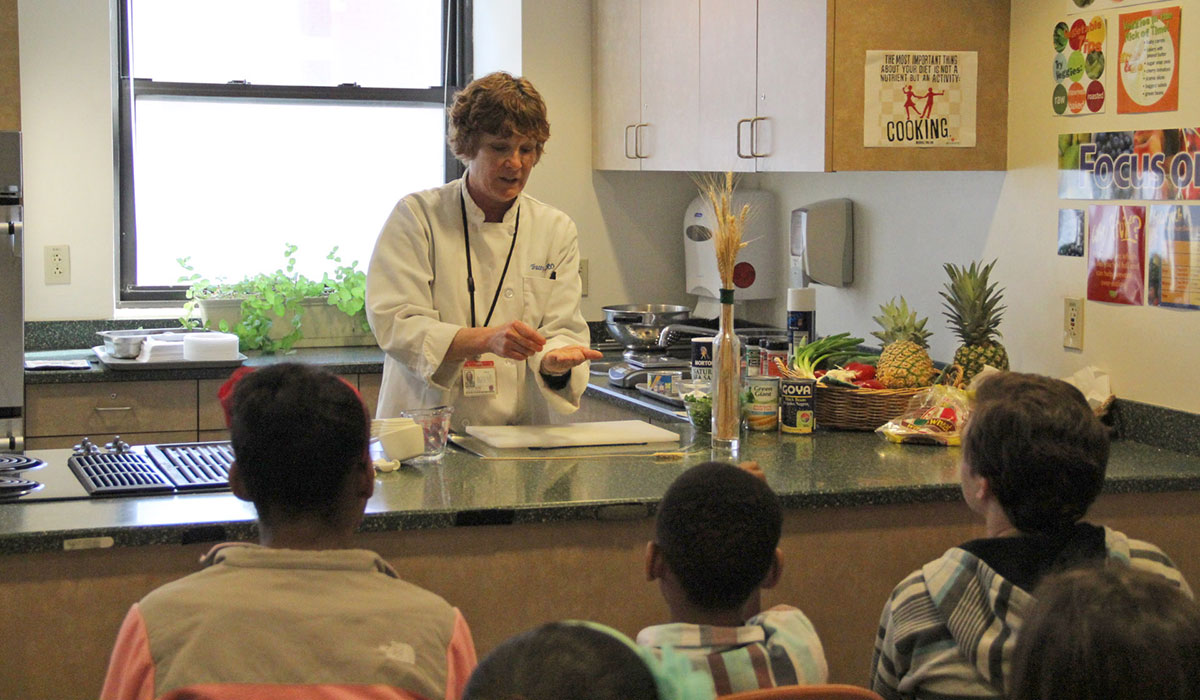Patients Are Learning to Cook Healthier at the Boston Medical Center Demonstration Kitchen

tracey burg gives patients a nutrition lesson in the boston medical center demonstration kitchen. photo provided to bostonmagazine.com.
Did you know that canola oil is just as healthy as olive oil, but is significantly less expensive? Or that bulgur wheat is a healthier alternative to rice? Or that a half cup of quinoa has as much protein as an ounce of meat?
This is exactly the kind of trivia that Tracey Burg, a registered dietitian and chef, shares with patients at the Boston Medical Center (BMC) Demonstration Kitchen. Since it opened alongside the hospital’s Preventive Food Pantry 14 years ago, the demonstration kitchen has played a significant role in educating the BMC community on healthy eating. Patients living with a variety of illnesses and medical conditions such as cancer, heart disease, and diabetes are encouraged to attend classes in the kitchen, where they’ll receive disease-specific nutrition information and an interactive cooking demonstration.
She says that her classes are based on the idea that patients can improve their nutrition practices by modifying what they already eat, as opposed to abandoning certain food items entirely. “All foods can fit. I don’t make any food a bad one,” Burg says. “It’s all about portion control and moderation.” Typical recipes made in class include Moroccan chicken stew, tofu and vegetable stir-fry, turkey chili, and even desserts like apple crisp.
Burg’s classes, which are attended by roughly 1,200 patients annually, are filled with information such as deciphering food labels, locating healthy items in the grocery store, and using alternative ingredients in recipes patients already make at home. She also provides shopping tips—including suggestions on how to pick ripe, fresh produce. Burg typically brings whole, uncut vegetables—sourced from the Preventive Food Pantry or the hospital’s rooftop garden—to classes so patients can see exactly what the vegetables look like. This practice can be especially useful when introducing patients to an item that they’ve never eaten or cooked with before, Burg says.
In addition to disease-specific classes, the demonstration kitchen also hosts sessions for weight management for those preparing and recovering from weight-loss surgery. Although the present space includes a working kitchen and 12-person seating area, participation in all classes is currently restricted to BMC patients and staff. But Burg hopes this will change when the new, expanded kitchen opens this June. She says that the new space will be three times as big, and may offer the potential for public participation.
Hospital reps say that, to their knowledge, BMC is the only hospital in the country with a program of this kind. Burg regularly receives phone calls from hospital administrators and dietitians around the country who would like to replicate the program at their institutions. Burg says that working in the unique environment of the demonstration kitchen has been rewarding.
“I love to cook. When [patients] come in here, I might be showing them how to cook, but they’re actually tasting it, they’re seeing how it’s done and they’re taking it home,” Burg says. “It’s gratifying to know that they’re actually using the recipes. It’s fun, and every day we do different foods. It doesn’t get boring.”
For healthy recipe ideas or more information on the Boston Medical Center Demonstration Kitchen, visit bmc.org.


